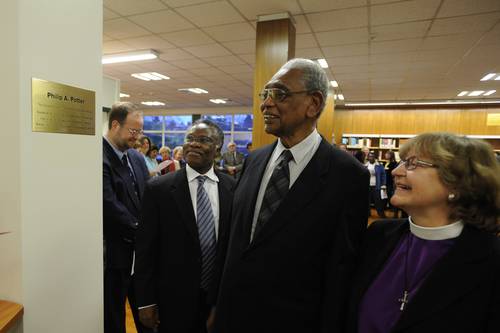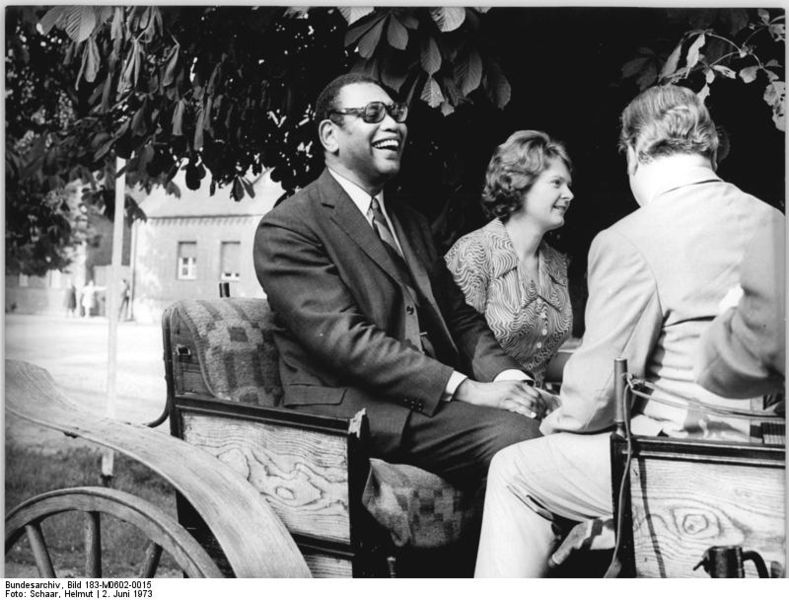Rev. Dr Philip Potter - A world icon
THOMSON FONTAINE
Sunday April 10, 2011, @ 11:41 p.m.
According to Potter, “it was a great moment for us. It was the first gathering of the church, the first big event, after the war. Churches had been on both sides of the conflict. I had come to Europe in 1947 to complete my studies in London at Richmond Methodist College. Then there was a world youth conference in Oslo in 1947.

Reverend Potter with his wife in a 2009 photo. |
"I was already known to Wim Visser 't Hooft, the first general secretary of the WCC. And here in Amsterdam were people who had been on both sides of the war. There were 100 of us youth delegates (50 men and 50 women). We constituted the choir! Then Visser 't Hooft asked me to address the Assembly on behalf of the youth. I spoke of our appreciation of being able to participate in this new relationship of churches."
In 1948 he served as a spokesperson for youth at the assemblies of the World Council of Churches, at Amsterdam. A feat he would latter repeat in Evanston in 1954.
His study program complete, and as a newly ordained minister, Potter headed out to Nevis to preach the gospel. A few months later and using his ability to speak the Creole language, which he learned in Dominica, he moved to Haiti, where he would remain for four years.
Potter recalls "It was very hard there. I was a bachelor living on my own in the manse. There was great poverty, and getting around was difficult. I had no car or jeep and had to cycle everywhere. One of my best friends was a neighbor’s dog.
One day I fell over and hurt myself when leaving a house I had been visiting, and the dog came up to me as I was lying on the ground and licked my face! To live among the poorest of the poor for four years was a most formative experience for me."
From Haiti, he moved to London to work on the staff of the Methodist Missionary Society. In 1954 Potter took the fateful decision to move to Geneva to work in the WCC's youth department. He would remain with the WCC until his retirement in 1984.

Reverend Potter in a visit to Germany. |
Potter struck a compelling figure, standing well over 6 feet, he exuded an air of confidence and calm that would serve him well through his tumultuous reign at the WCC. There he dealt with competing demands concerning the persecuted church in Eastern Europe under communism, escalating East-West tensions, and the ugly specter of apartheid South Africa.
His Work at the WCC
Once in Geneva, Potter threw himself wholeheartedly into the organization’s mission. Then in 1960 moved back to London as secretary for West Africa and the West Indies in the Methodist Missionary Society. From 1960 to 1968 he also served as chair of the World Student Christian Federation and director of the WCC division of world mission and evangelism from 1967 to 1972.
In 1972 he was elected Secretary General of the WCC becoming the first black person to hold the post as well as the first from the developing world.
In August 1978, he drew severe criticism from white leaders in Zimbabwe (Rhodesia at the time) for approving a grant of $85 000 to Robert Mugabe’s Patriotic Front. The special fund to combat racism was set up by the WCC in 1970.
Potter also came up against stiff opposition from some members who thought that the organization was becoming too political. The Patriotic Front grant especially disturbed the huge Evangelical Church in Germany (E.K.D.) and some openly pushed for an end to the fund.
Undaunted, Potter in addressing the Executive Committee of the WCC in January 1979 called on the council to begin now “to further combat racism in the 1980s.” He spoke eloquently against "political and economic oppression" and called for a process of consultation where the churches would examine ways to involve themselves more directly in the fight against racism.
Page 1|Page 3|Page 4
|

